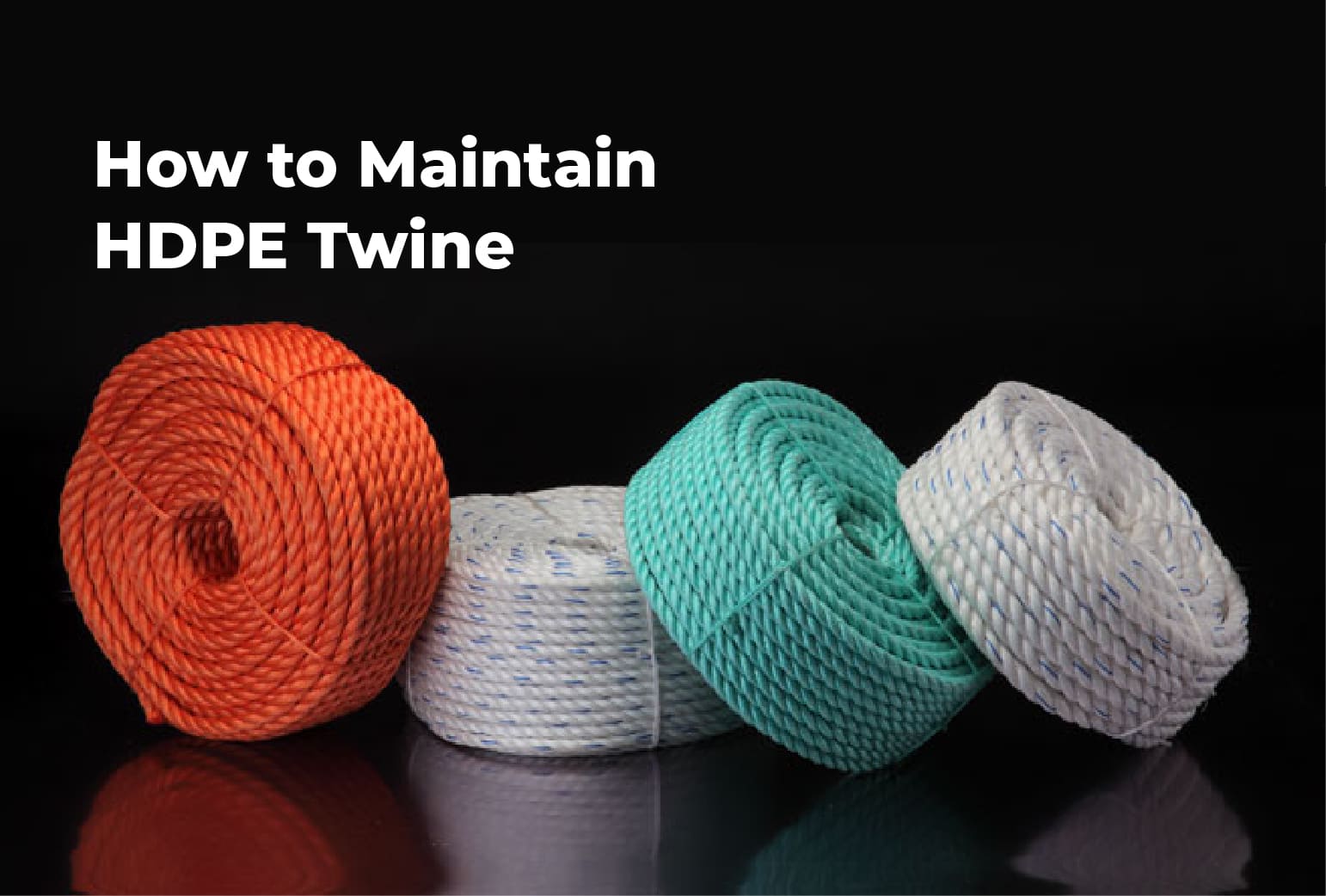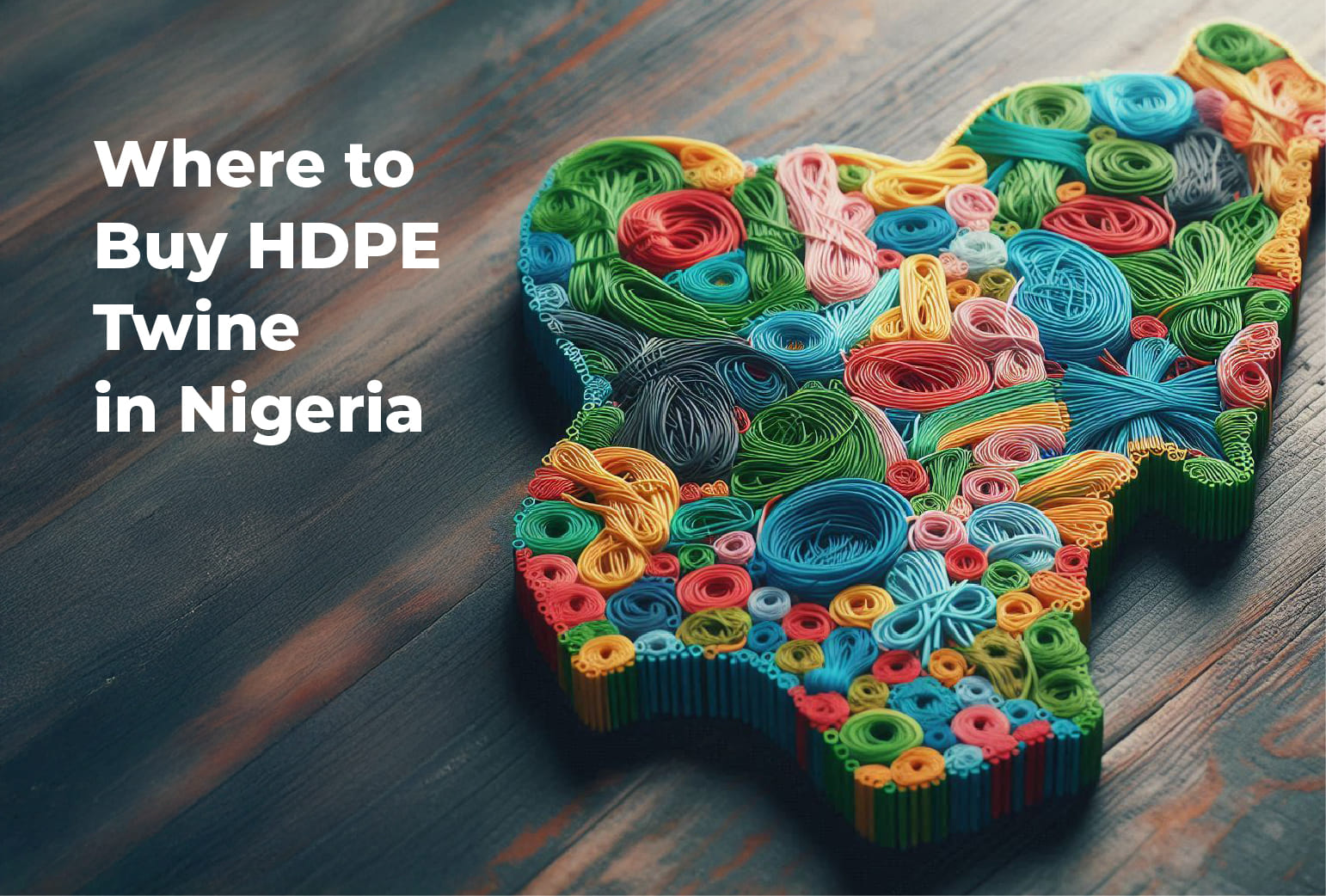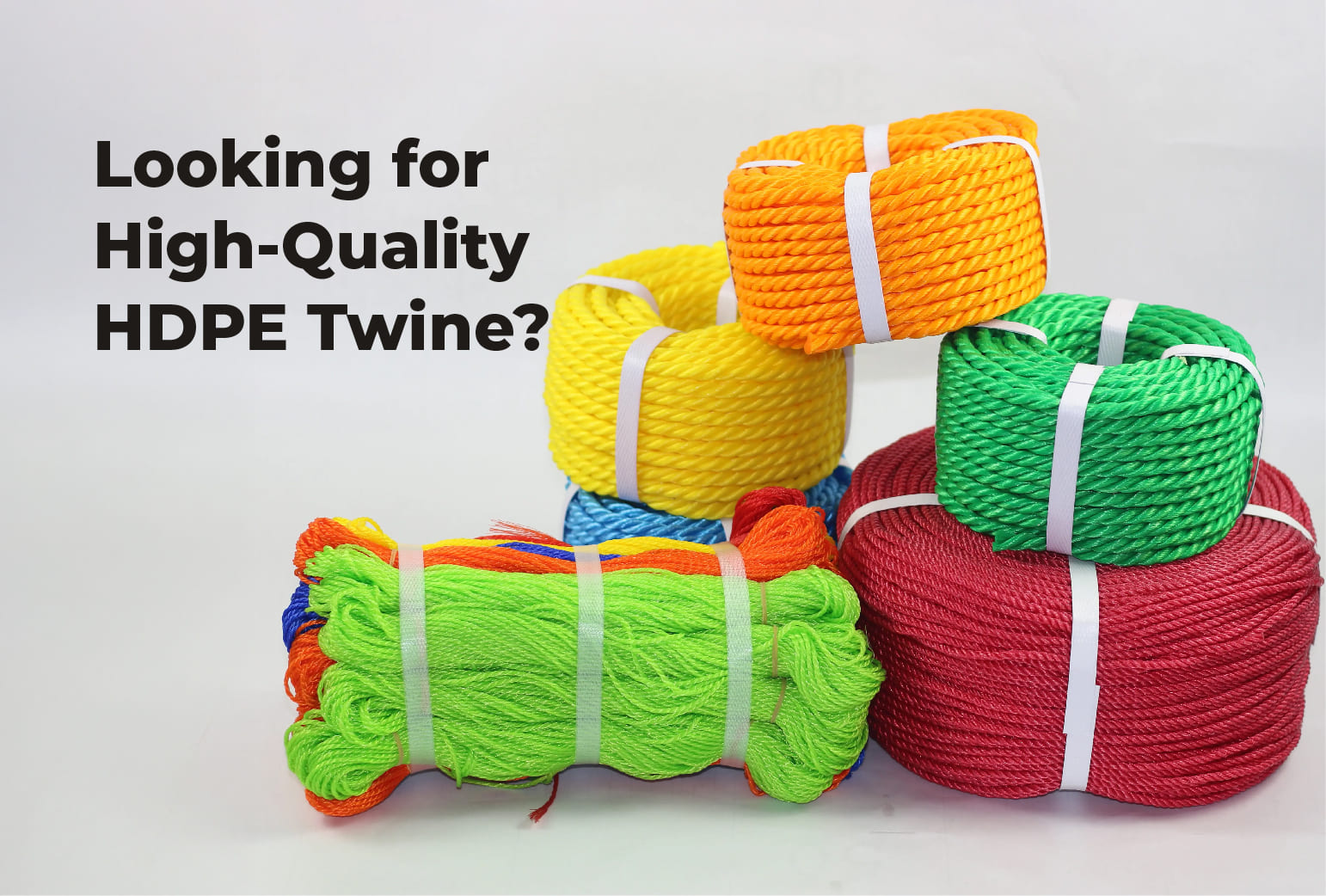Ultimate Guide to HDPE Twine
.jpg)
HDPE twine has become one of the most used binding and fastening materials across industries that demand exceptional strength, durability, and resistance to environmental stress. Popularly known for its superior tensile strength and resilience, HDPE twine is designed to withstand heavy loads, harsh weather conditions, and long-term exposure to outdoor elements without losing its effectiveness.
HDPE twine is built to withstand conditions that quickly weaken natural fibers, such as moisture, intense sunlight, and harsh weather. It retains its strength and reliability over time, making it a preferred choice across industries. In agriculture, it is used for tying crops and securing produce. The fishing and aquaculture industries depend on it for durable nets and strong mooring lines, while packaging and logistics companies rely on its resilience to keep goods safe during transit. In construction, both HDPE twine and HDPE rope prove their value by performing under heavy loads and continuous outdoor exposure, offering a dependable and long-lasting solution for challenging environments.
The growing demand for HDPE rope and twine is driven by its cost-effectiveness and long service life compared to natural fiber alternatives like jute or cotton, which tend to weaken when exposed to moisture. Businesses looking for reliability and quality in their operations cannot afford to compromise on the source of their materials. This is why working with the best HDPE twine manufacturer in Ibadan, and its environs is crucial. A reputable manufacturer guarantees products that meet international quality standards, ensuring strength, uniformity, and safety for both industrial and domestic use.
What is HDPE Twine?
HDPE (High-Density Polyethylene) twine is a durable and lightweight cord made from High-Density Polyethylene (HDPE), a strong thermoplastic polymer known for its exceptional resistance to wear, moisture, and UV radiation. Unlike natural fiber ropes, which can degrade over time when exposed to water or harsh weather, HDPE twine retains its strength and flexibility, even under extreme outdoor conditions. It is commonly manufactured by extruding HDPE fibers, which are then twisted or braided into strong strands, creating a reliable material that can withstand tension and heavy loads.
Key Characteristics
.jpg)
The defining features of HDPE twine lie in its lightweight nature paired with remarkable strength, which allows it to handle considerable tension without breaking. Its resistance to rotting, mildew, and abrasion ensures longevity even in humid, wet, or chemically exposed environments. Unlike other ropes, HDPE does not swell or lose integrity when submerged in water, and UV stabilizers incorporated during manufacturing protect it from sun damage. These qualities make HDPE twine a versatile solution for numerous sectors that demand both strength and resilience.
How is HDPE Twine Manufactured?
.jpg)
The manufacturing process begins with HDPE granules, which are melted and extruded into filaments. These filaments are stretched to enhance their molecular orientation, improving strength and flexibility. They are then twisted or braided into twine, depending on the intended application. To enhance durability, UV stabilizers and color pigments are added during production, ensuring the finished product maintains integrity under harsh sunlight and environmental conditions. The result is a lightweight yet robust material capable of meeting industrial standards for strength and performance.
Common Manufacturing Variants
.jpg)
HDPE twine comes in various thicknesses and ply counts to serve different purposes. While single-ply twine is ideal for lighter tasks, multi-ply options are preferred for heavy-duty uses. Variants also differ in color coding, which assists in identifying specific uses in agriculture, marine operations, or construction projects.
Applications of HDPE Twine
.jpg)
The versatility of HDPE twine makes it a crucial material across a number of industries, for both large-scale commercial operations and everyday household tasks. Its strength, flexibility, and resistance to harsh weather conditions gives it a unique advantage over natural fibers or other synthetic alternatives. HDPE twine and HDPE rope offer durability and performance that stand the test of time. Businesses that require reliable binding and fastening solutions often prefer sourcing from the best HDPE twine manufacturer in Ibadan to ensure they receive products that meet international quality standards for strength and resilience. Here are a number of industries that benefit from the use of HDPE twine:
Agriculture
Agricultural uses are among the largest uses of HDPE twine. Farmers depend on it for tying plants, bundling crops like maize or vegetables, and securing produce during transport. Unlike natural fiber twines that degrade under rain or direct sunlight, HDPE twine remains strong throughout the farming season. Its UV resistance and non-absorbent nature make it perfect for outdoor use, while its lightweight yet sturdy structure ensures ease of handling during planting, harvesting, and packaging.
Fishing And Aquaculture
The fishing industry values HDPE rope and twine for their ability to endure harsh marine conditions. It is used to create long-lasting fishing nets, lobster or crab traps, and mooring lines that resist damage from saltwater and constant UV exposure. Its high tensile strength ensures it doesn’t break under the weight of heavy catches, making it a dependable material for professional fishermen and aquaculture setups.
Packaging And Logistics
In the packaging and logistics sector, HDPE twine serves as a reliable material for bundling, tying, and securing goods during shipping or storage. Its strength ensures that products remain intact during handling, while its flexibility allows it to hold items tightly without causing damage. Businesses in warehousing and distribution prefer HDPE twine for its cost-effectiveness and ability to withstand pressure and tension during transport.
Construction
Construction sites use HDPE twine and rope for tying building materials, marking boundaries, and supporting scaffolding. Its durability under heavy loads and exposure to outdoor elements like rain and heat makes it an ideal choice for construction workers who need a strong, long-lasting binding solution.
DIY And Household Use
Outside of industrial advantages, HDPE twine is equally valuable for home projects and general household use. It’s commonly used in gardening, tying plants, securing outdoor furniture, and even as a reliable material for moving and organizing items. Its easy handling and resilience make it a go-to tool for various DIY tasks.
Benefits of Using HDPE Twine
.jpg)
The enduring popularity of HDPE twine stems from its superior qualities compared to alternative materials. Its non-absorbent nature makes it resistant to rot and mildew, ensuring longevity in wet environments. It retains flexibility and strength even after prolonged exposure to UV rays, reducing replacement costs over time. Additionally, HDPE twine is lightweight yet incredibly strong, making it easy to handle without compromising performance. These characteristics collectively provide cost savings, operational efficiency, and confidence in the product’s reliability for critical applications.
1. Strength and durability
One of the primary benefits of HDPE twine is its unmatched strength and durability. It is designed to withstand heavy loads and repeated use without fraying or breaking, even under extreme tension. This makes it ideal for tasks such as tying, bundling, or securing items that require long-term reliability.
2. Weather resistance
Another major advantage is that HDPE twine does not absorb moisture, and its UV stabilizers protect it from degradation caused by prolonged sun exposure. This allows it to retain its strength and flexibility in outdoor conditions where natural fibers would weaken or rot.
3. Resistance to chemicals, rot, and abrasion
HDPE twine is also known for resistance to rot, which makes it particularly useful in industries such as fishing, aquaculture, and construction. Its ability to perform in challenging conditions, including exposure to saltwater or corrosive substances, ensures that it remains a dependable solution in both marine and industrial settings.
4. Cost-effectiveness
From a financial standpoint, HDPE twine is cost-effective and low maintenance. Its long lifespan reduces the need for frequent replacements, making it a more economical option in the long run compared to other materials. It is also lightweight and easy to handle, making it convenient for everyday tasks in both industrial and household applications.
5. Versatility
HDPE twine is versatile, serving multiple functions across different sectors for different activities such as tying crops, crafting fishing nets, securing packages, or handling construction materials. HDPE twine delivers consistent performance across all uses and industries.
How to Choose the Right HDPE Twine
.jpg)
Selecting the correct HDPE twine depends on factors such as the application, load requirements, and exposure to environmental conditions. For heavy-duty industrial tasks, multi-ply twine with UV protection is ideal, whereas lighter variants work well for household and agricultural use. Ensuring that the twine is sourced from a trusted supplier guarantees consistency in strength and quality, particularly for businesses that rely on bulk purchases for large-scale operations.
What Makes HDPE Twine Unique?
.jpg)
The uniqueness of HDPE twine lies in its balance of strength, durability, and weather resistance. Unlike natural fiber alternatives, it does not degrade in water or sunlight, and unlike some synthetic options, it maintains structural integrity under stress without stretching excessively. This combination of features makes it indispensable for industries that require dependable performance in harsh environments.
HDPE Twine vs. Other Materials
.jpg)
When compared to natural fiber ropes such as jute or cotton, HDPE twine demonstrates superior longevity and resilience. While jute ropes absorb moisture and weaken over time, HDPE twine remains unaffected, ensuring continued performance. When compared to other synthetic materials, HDPE stands out for its UV resistance and low water absorption. Although it is not biodegradable, its recyclability makes it a more sustainable option when managed responsibly.
UV Resistance
One of the standout advantages of HDPE twine over natural fibers is its resistance to UV rays. Traditional ropes made of cotton or jute quickly degrade under prolonged sunlight exposure, becoming brittle and weak. HDPE twine is manufactured with UV stabilizers that allow it to endure extended outdoor use without losing its tensile strength or flexibility, making it ideal for tasks like farming, fishing, and outdoor packaging.
Water Resistance
HDPE twine’s hydrophobic nature sets it apart from materials like cotton or jute, which readily absorb water and deteriorate over time. HDPE does not swell, rot, or lose integrity when exposed to moisture or saltwater. This property is particularly beneficial for marine applications such as fishing nets, aquaculture, and mooring lines, where performance under wet conditions is critical.
Biodegradability
While natural fibre twines are biodegradable and decompose over time, HDPE twine is not naturally biodegradable due to its synthetic composition. However, it compensates for this with recyclability. HDPE can be collected and repurposed, making it a sustainable choice when managed correctly, especially for industries that prioritize long-lasting materials over short-term solutions.
Cost
From a cost perspective, HDPE twine proves to be more economical in the long run. Although natural fibre ropes might be cheaper initially, they require frequent replacement due to their susceptibility to moisture and UV damage. HDPE twine’s longevity and low maintenance needs reduce overall costs, making it a practical choice for both industrial and domestic use.
Strength
Strength is another area where HDPE twine surpasses other materials. It offers high tensile strength and excellent load-bearing capacity, outperforming natural fibers and even some synthetic alternatives like polypropylene. Whether in construction for tying heavy materials or in logistics for bundling and securing goods, HDPE twine remains a reliable and durable solution.
Sustainable Considerations
.jpg)
HDPE twine is fully recyclable, contributing to eco-friendly practices when properly disposed of or repurposed. Leading manufacturers focus on sustainable production processes that minimize waste and reduce environmental impact, aligning with global efforts toward greener construction and industrial practices.
How to Maintain HDPE Twine

Maintaining HDPE twine requires minimal effort. Proper storage in a dry, shaded area prevents unnecessary wear, and rinsing after use in saltwater or chemically harsh environments can prolong its life. Avoiding contact with sharp edges ensures that the fibres remain intact, preserving the twine’s strength and usability.
Where to Buy HDPE Twine in Nigeria

For businesses and individuals seeking quality and reliability, sourcing from the best HDPE twine manufacturer in Ibadan is crucial. Quantum Plastic, the leading manufacturer of HDPE twine, ensures premium-grade products and also provides consistency, technical support, and timely delivery for projects that cannot afford delays.
Looking for High-Quality HDPE Twine?

If performance, durability, and cost-effectiveness matter to your business, then HDPE twine is the solution you need. Look out for the best HDPE twine manufacturer in Ibadan for products engineered to meet international standards and tailored to your specific requirements. From bulk orders for agriculture and fishing to custom solutions for construction and packaging, you deserve a supplier that guarantees excellence.
HDPE twine has established itself as an essential tool across multiple sectors due to its unmatched combination of strength, flexibility, and environmental resistance. Its role in ensuring efficiency and reliability in critical applications cannot be overstated. By sourcing from a trusted supplier, you secure not just a product but a long-term solution that supports your business objectives. Ready to experience the difference? Contact Quantum Plastic, the best HDPE twine manufacturer in Ibadan today and secure high-quality products that deliver performance and durability for all your industrial, commercial, and domestic needs. Reach out to us via our website www.quantumplasticnig.com to get started.







